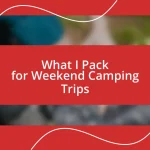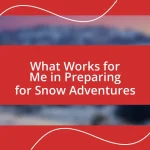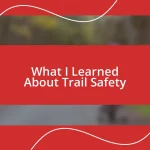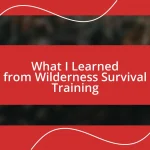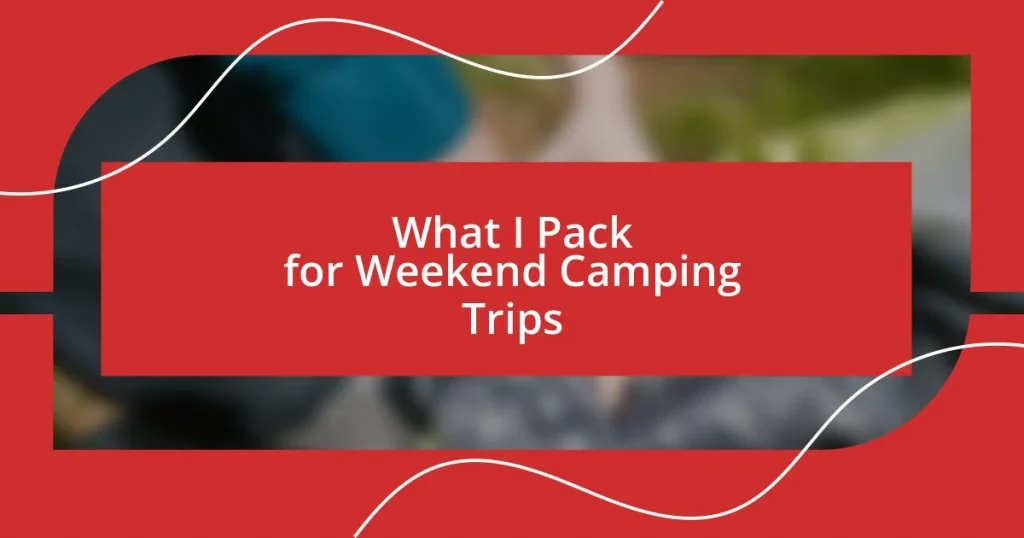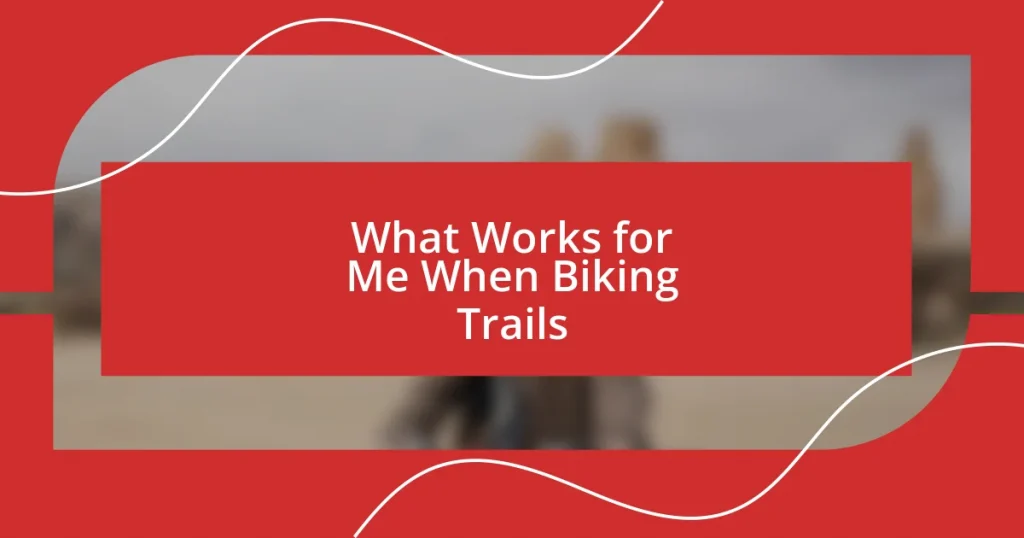Key takeaways:
- Essential gear for camping includes a durable tent, a sleeping bag, a portable stove, safety items, and personal care essentials.
- Layering clothing is crucial for unpredictable weather, and proper footwear greatly enhances comfort during hikes.
- Use a checklist, packing cubes, and pre-packed meals for efficient organization and to avoid last-minute packing mistakes.
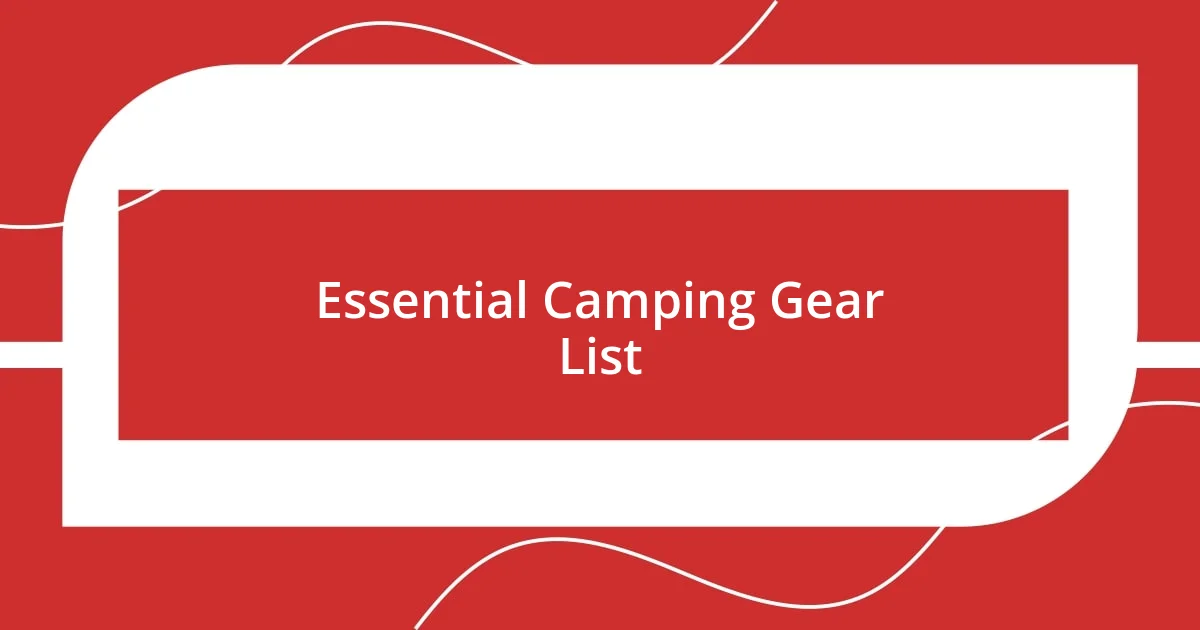
Essential Camping Gear List
When compiling an essential camping gear list, I always start with the basics: a durable tent, a sleeping bag rated for the season, and a comfy sleeping pad. I remember one trip when I foolishly forgot my sleeping pad; that night, I learned firsthand how hard and uncomfortable the ground can be! What’s the point of enjoying the great outdoors if you’re exhausted from a poor night’s sleep?
Next on my list are cooking essentials—think portable stove, lightweight cookware, and, of course, a trusty cooler packed with food and drinks. I once had a fantastic cooking experience over an open flame, savoring the smell of grilled veggies and marinated chicken while sharing stories with friends. Isn’t it amazing how food tastes better when you’re surrounded by nature?
Lastly, don’t forget safety gear: a first-aid kit, a reliable flashlight, and a portable charger for your phone. I’ve had moments when my flashlight was my lifeline, guiding me through the darkness. Have you ever been in a situation where the light you carry can change everything? It’s experiences like these that remind me how vital it is to be prepared.
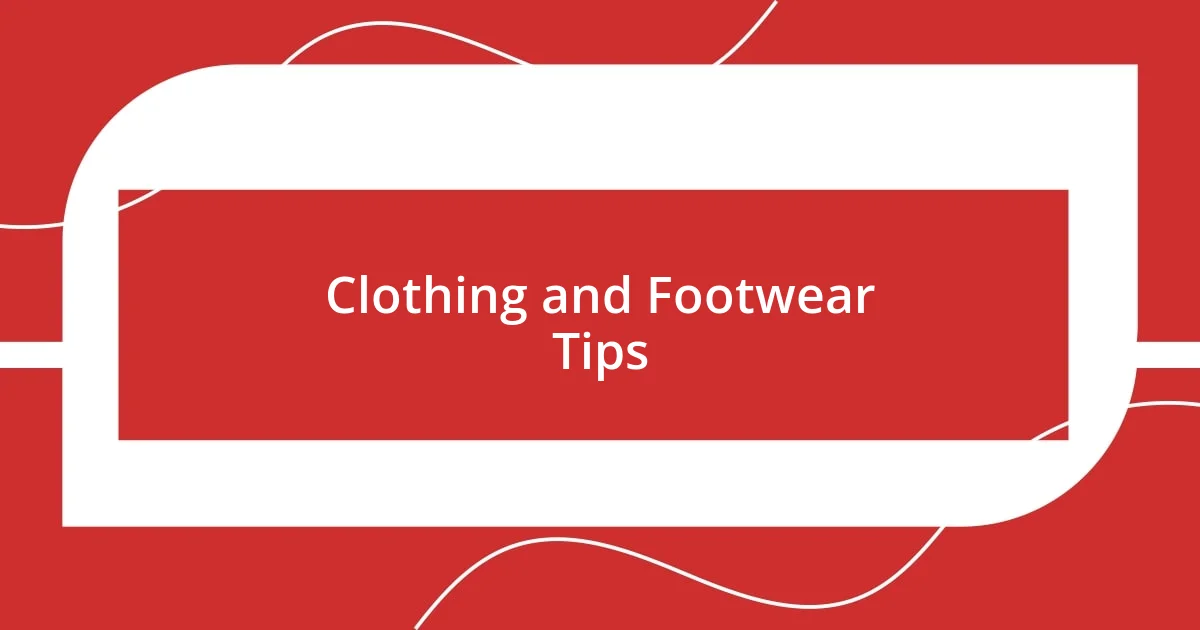
Clothing and Footwear Tips
When it comes to clothing for a weekend camping trip, layering is key. I’ve often found myself in unpredictable weather, going from warm sunshine to sudden rain in a matter of minutes. That’s why I always pack moisture-wicking base layers, insulating mid-layers, and a waterproof outer shell. On one trip, I was caught in a downpour, but thanks to my layered approach, I stayed warm and dry while others were soaked and shivering.
Footwear is equally important, and I’ve learned the hard way not to underestimate comfort. Choosing the right pair of boots can make all the difference for long hikes. I remember one exhausting trek where my old boots caused blisters that left me hobbling back to camp. I now opt for sturdy, breathable hiking boots with good traction. It’s a small investment for comfort, and your feet will thank you after a long day of exploring.
The right accessories can elevate your camping experience, so I never overlook items like a wide-brimmed hat and moisture-wicking socks. On a particularly hot day, I remember slipping on my favorite pair of socks that kept my feet dry and blister-free, allowing me to focus solely on the stunning views and fresh air. A simple hat not only protects my face from the sun but also keeps me cool. These little touches contribute to a much more enjoyable adventure.
| Clothing Item | Purpose |
|---|---|
| Moisture-Wicking Base Layers | Keep you dry and comfortable |
| Insulating Mid-Layers | Provide warmth in cooler conditions |
| Waterproof Outer Shell | Protect against rain and wind |
| Comfortable Hiking Boots | Support and protect your feet during hikes |
| Wide-Brimmed Hat | Shield from sun and keep cool |
| Moisture-Wicking Socks | Prevent blisters and keep feet dry |
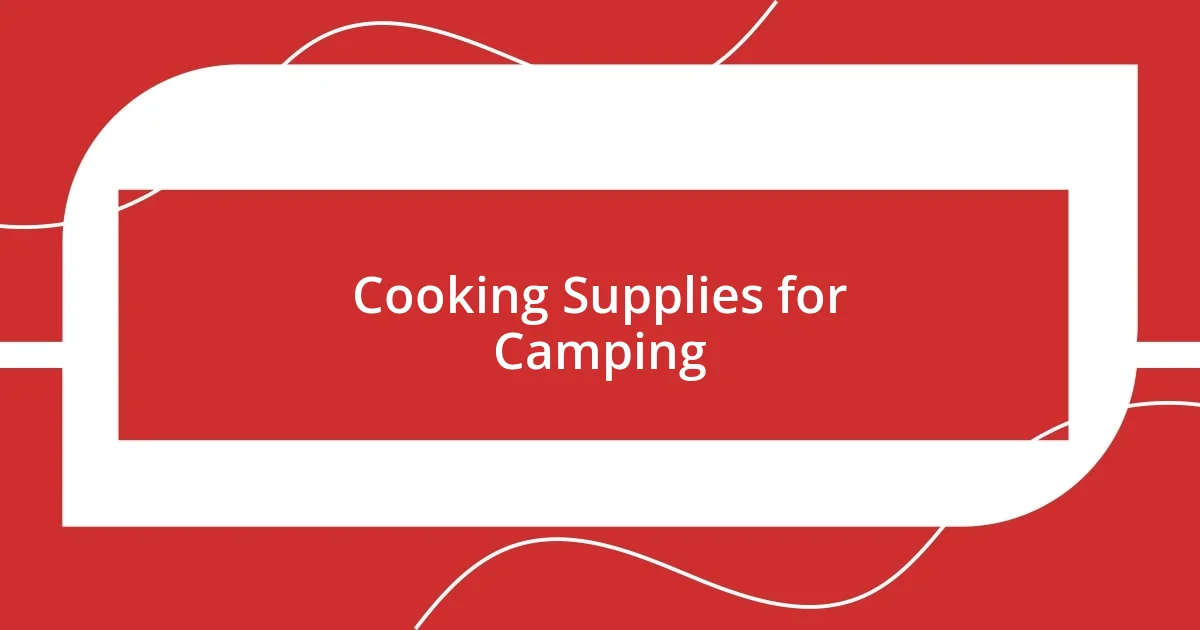
Cooking Supplies for Camping
When it comes to cooking supplies for camping, I find that keeping it simple yet effective is the best approach. I remember one of my early camping trips when I packed way too many gadgets—spatulas, multi-tools, and fancy pots. All I really needed were lightweight, multi-functional tools that made cooking over the fire enjoyable rather than overwhelming. A good portable stove can save you from the unpredictability of campfires and offers better control over cooking temperatures.
Here’s my go-to list of essential cooking supplies for camping:
– Portable Stove: A reliable option for everything from boiling water to sautéing veggies.
– Lightweight Cookware: Non-stick pots and pans that are easy to clean and transport.
– Cooking Utensils: A spatula and long-handled tongs are often all I need to flip and serve.
– Cutting Board and Knife: Essential for meal prep, bringing a good knife can make all the difference.
– Cooler: Keeps perishables fresh, and I’ve learned to choose one that’s well-insulated for longer trips.
– Reusable Plates and Utensils: Eco-friendly and practical, they make cleanup a breeze.
I recall one night while camping under the stars, where I made a simple pasta dish with cherry tomatoes and basil from our garden. There was something magical about cooking outdoors, illuminated by the soft glow of my portable stove. Everyone gathered around the campfire, eagerly waiting for their plate—food always seems to taste better with friends and a breathtaking view. It’s these moments of connection and satisfaction that I cherish the most while camping.
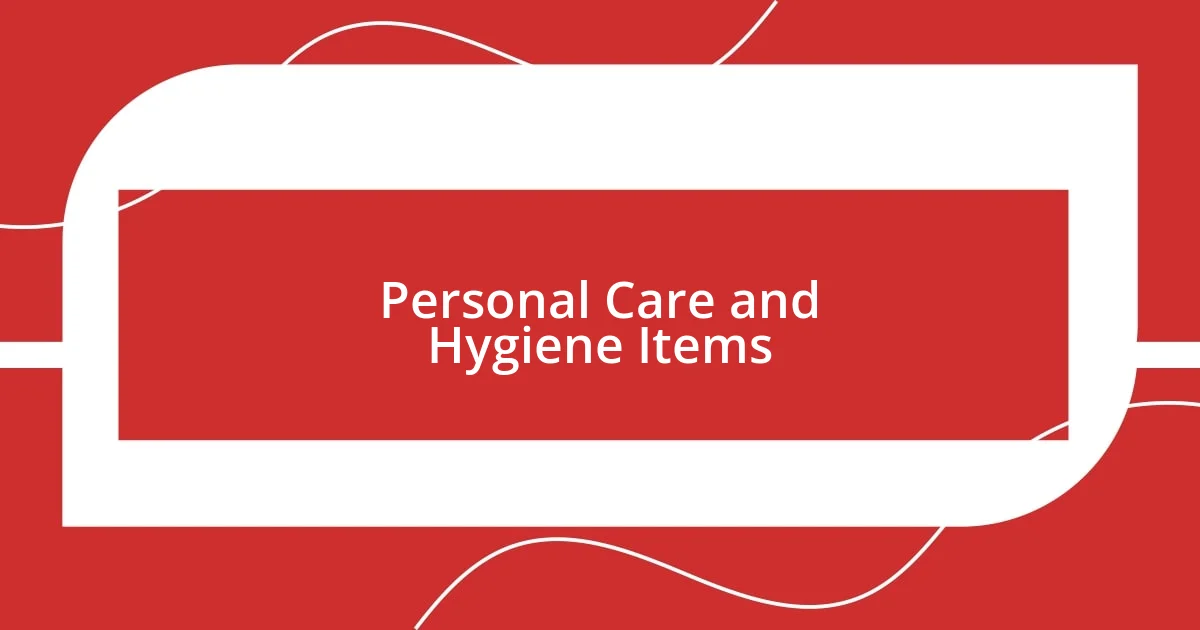
Personal Care and Hygiene Items
When packing for a weekend camping trip, personal care and hygiene items shouldn’t be overlooked. I always bring a travel-sized toiletry kit, which includes essentials like biodegradable soap, toothpaste, and a toothbrush. I once forgot these basics on a trip and spent the weekend feeling less than fresh—it’s amazing how much a little cleanliness can enhance your mood in the great outdoors.
I never underestimate the importance of good sunscreen and insect repellent. On a particularly memorable hike, I slathered on some high-SPF sunscreen after an impromptu swim in a lake. The last thing I wanted was to return home with a sunburn that would take days to heal. I also recall a time when I got swarmed by mosquitoes during dinner; since then, I’ve been diligent about applying repellent before every meal. Trust me, the outdoors is much more enjoyable when you’re not battling bugs or nursing a sunburn!
Additionally, I find it incredibly helpful to pack a small microfiber towel and a personal first aid kit. The microfiber towel dries quickly and takes up minimal space—perfect for those unexpected rain showers or if you decide to wash your face in the stream. I can’t tell you how many times I’ve used my first aid kit for scrapes and insect bites—I remember one trip when a friend tripped on a root, and my quick access to bandages saved the day. Being prepared not only gives you peace of mind, but it also allows for more spontaneous adventures!
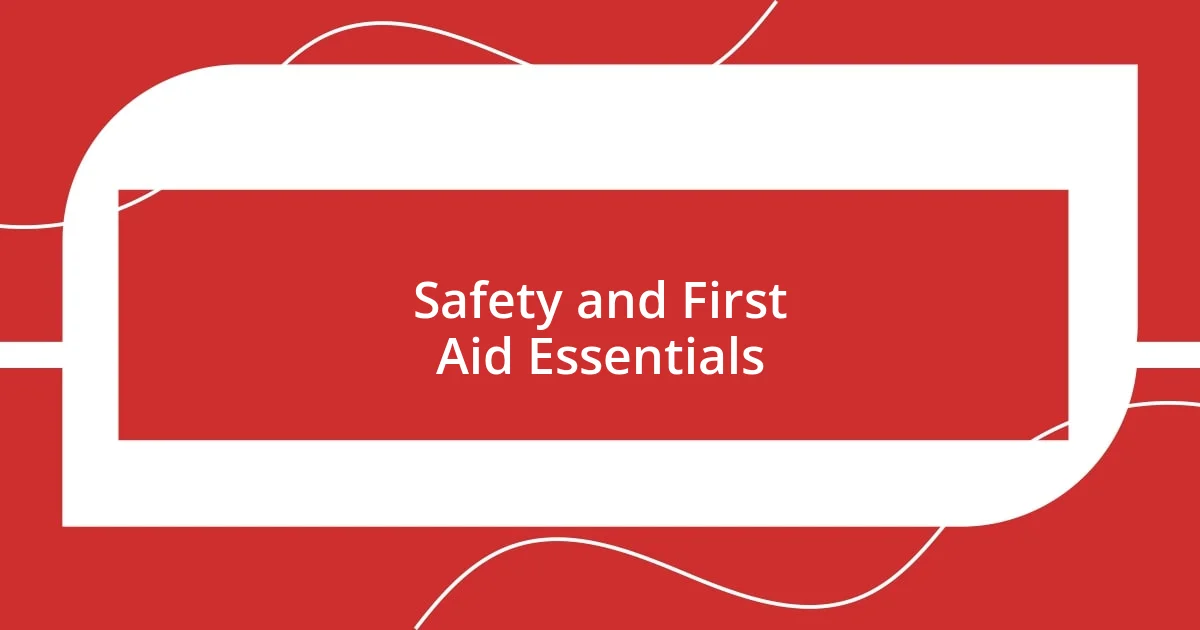
Safety and First Aid Essentials
When it comes to safety and first aid essentials for camping, I can’t stress enough the importance of being prepared. I always carry a compact first aid kit filled with band-aids, antiseptic wipes, and pain relievers. There’s a comforting reassurance in knowing I have what I need, especially during those moments when a small mishap occurs, like when my hiking buddy stumbled and scraped his knee. In that situation, having my kit on hand made all the difference—not just for his comfort but for my peace of mind as well.
It’s also wise to pack specific safety items like a whistle, a flashlight, and a fire starter. On one memorable trip, we got a little turned around during a hike and ended up staying out longer than expected. The sun was setting fast, and panic began to creep in. Luckily, my flashlight helped us navigate back to camp safely. I remember that sense of relief washing over me when we finally spotted our campsite glimmering in the distance; those little safety tools can truly be lifesavers.
Additionally, I find it incredibly important to bring along a multipurpose tool, which can come in handy in various situations—whether it’s for minor repairs or as a means of protection if wildlife comes too close. There’s an empowering feeling in knowing you’re equipped to handle many scenarios. One time, as we were setting up our tent, a curious raccoon approached. With my tool in hand, I knew we could manage the situation safely without a fuss. It’s those little moments of security that enhance your camping experience, allowing for more enjoyment and less worry.
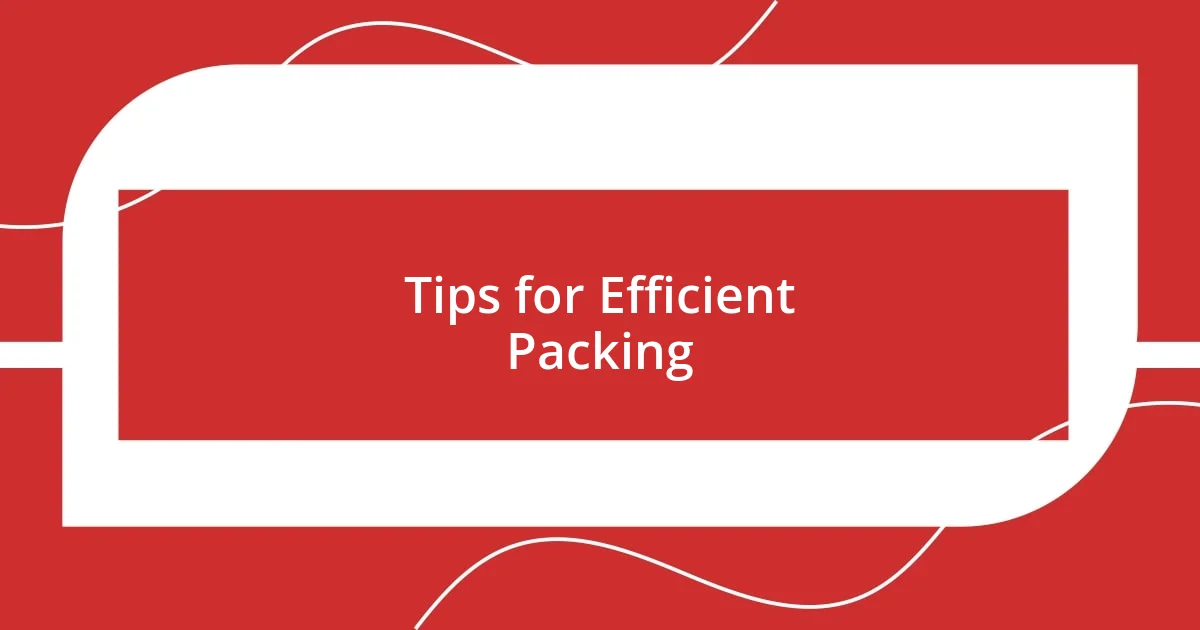
Tips for Efficient Packing
When packing for a weekend camping trip, I’ve found that having a checklist makes a world of difference. I take time to write down everything I need, from gear to food, ensuring I don’t forget anything essential. I still chuckle when I recall how I once left my tent behind because I rushed through packing—talk about a camping faux pas! A checklist helps me visualize what I’ll be using each day, and it saves me from those last-minute panic runs to the store.
Another tip is to use packing cubes or compression bags. These handy organizers keep everything neatly arranged, allowing me to maximize space in my backpack. I can never forget my first camping trip with two overly stuffy bags where I couldn’t find anything! Now, with compression bags, it’s easier to fit my clothes and gear snugly, leaving room for all the treats I want to bring along. Who doesn’t love a cozy hoodie at night while enjoying s’mores by the fire?
Lastly, I’ve learned the value of pre-packing my meals. I personally invest time in preparing easy-to-cook meals ahead of my camping trips. It not only saves time at the campsite but ensures I have delicious options without the hassle of meal planning on-site. I remember during one camping adventure when we had a culinary fiasco because we didn’t think ahead—nothing quite like cold oatmeal for breakfast! By organizing my meals beforehand, I can focus on enjoying nature and creating lasting memories with friends rather than stressing over what to eat next. What are your go-to meal prep tips for camping?


